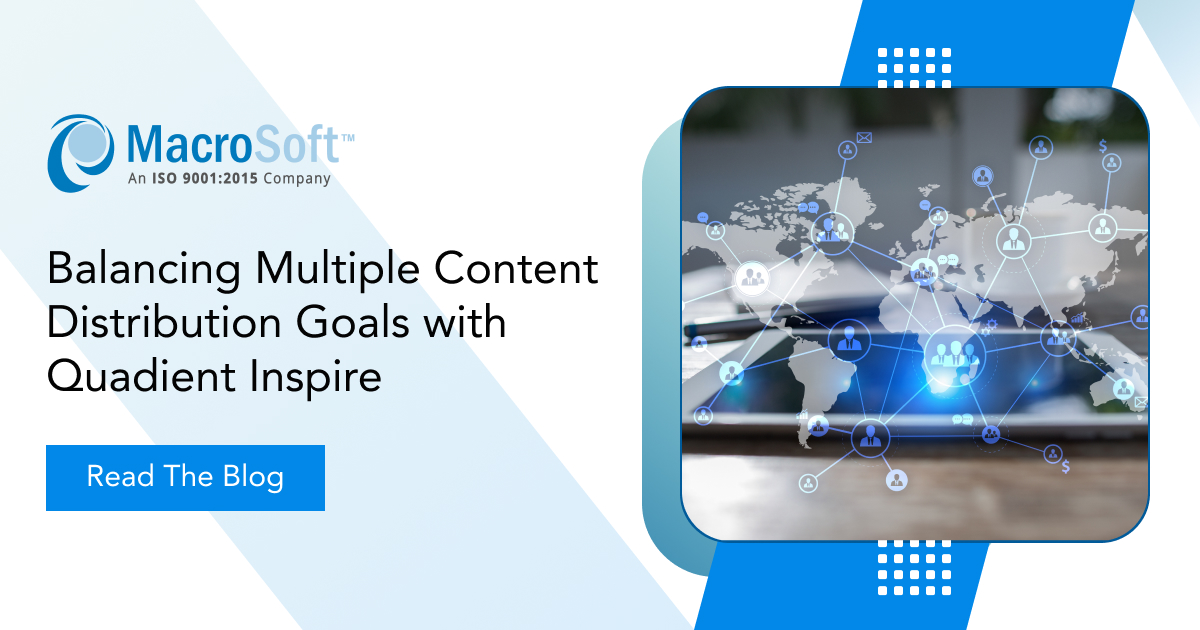

In today’s digital landscape, content distribution is a critical aspect of any successful marketing strategy. However, businesses often find themselves juggling multiple content distribution goals, such as reaching a broader audience, personalizing content for different segments, ensuring compliance, and optimizing operational efficiency. Balancing these goals can be a complex task, but with the right tools and strategies, it’s achievable. One such tool that can help you strike the perfect balance is Quadient. In this blog, we’ll explore how you can leverage Quadient to achieve your content distribution goals effectively.
Understanding Quadient
Quadient is a leading provider of Customer Communications Management (CCM) solutions. Their platform offers a wide range of capabilities to streamline and optimize content creation, distribution, and management. Quadient empowers organizations to improve customer engagement, enhance communication, and drive operational efficiency.
Balancing Multiple Content Distribution Goals
1. Reaching a Broader Audience
One of the primary goals of content distribution is to reach as many potential customers as possible. Quadient assists in achieving this goal by enabling multichannel content distribution. With Quadient, you can seamlessly distribute content through various channels, including email, print, SMS, and social media. This multichannel approach ensures that your content reaches a broader and more diverse audience.
2. Personalization
Personalization is key to engaging customers and driving conversions. Quadient’s CCM platform allows you to create dynamic and personalized content effortlessly. By leveraging customer data and segmentation, you can tailor your messages to specific audiences, increasing the relevance of your content and improving customer satisfaction.
3. Compliance
Maintaining compliance with industry regulations and internal policies is crucial for businesses, especially in sectors like finance, healthcare, and insurance. Quadient offers compliance management features that ensure your content meets regulatory requirements. It helps you generate compliant documents, manage version control, and track distribution, reducing the risk of compliance breaches.
4. Operational Efficiency
Efficiency is at the heart of every successful business operation. Quadient streamlines content creation and distribution workflows, automating repetitive tasks and reducing manual errors. This not only saves time and resources but also ensures consistency in your communications.
Implementing Quadient for Balancing Content Distribution Goals
Now that you understand how Quadient can assist in achieving your content distribution goals, here’s a step-by-step guide to implementing it effectively:
1. Assess Your Goals
Begin by clearly defining your content distribution goals. Identify your target audience, channels, personalization requirements, and compliance needs. Consider the following when setting your goals:
- Audience: Who is your target audience? Are they existing customers, potential leads, or a specific demographic group?
- Channels: Which distribution channels will you utilize? Common options include email, print, mobile apps, web portals, and social media.
- Personalization: How personalized does your content need to be? Define the level of personalization required for different audience segments.
- Compliance: Are there specific regulations or industry standards you need to adhere to? Ensure your content complies with all relevant legal and regulatory requirements.
2. Collect and Segment Data
Gather customer data and segment your audience based on demographics, behavior, and preferences. Quadient’s data management capabilities can help you organize and utilize this information effectively.
- Data Collection: Gather customer data from various sources, such as CRM systems, marketing databases, and transaction records.
- Data Quality: Ensure data accuracy, consistency, and completeness by regularly cleansing and validating your data.
- Segmentation: Segment your audience based on factors like demographics, purchase history, and behavior to tailor your content effectively.
- Integration: Integrate Quadient Inspire with your existing data sources to create a unified customer view.
3. Create Personalized Content
Utilize Quadient’s content creation tools to design personalized content templates that can be customized for different segments of your audience.
- Templates: Create dynamic content templates that can be easily customized for different segments.
- Personalization: Leverage customer data to insert personalized elements, such as names, product recommendations, or location-based information.
- Compliance Checks: Implement compliance checks within the content creation process to ensure all regulatory requirements are met.
- Version Control: Maintain version control to track changes and updates to your content templates.
4. Multichannel Distribution
Leverage Quadient’s multichannel distribution capabilities to send content through various channels, ensuring maximum reach.
- Channel Selection: Choose the most appropriate distribution channels for your audience. For example, healthcare professionals might prefer email and web portals, while some customers prefer print materials.
- Automation: Automate the distribution process to ensure timely delivery of content without manual intervention.
- Cross-Channel Consistency: Ensure a consistent brand message and look across all channels for a seamless customer experience.
- Response Tracking: Use Quadient Inspire to track responses and interactions across different channels, helping you understand what’s working and what needs adjustment.
5. Monitoring and Optimization
Use Quadient’s reporting and analytics features to track the performance of your content distribution efforts. Analyze customer engagement, compliance adherence, and operational efficiency.
- Analytics: Utilize Quadient Inspire’s reporting, and analytics features to monitor the performance of your content distribution efforts. Metrics could include open rates, click-through rates, conversion rates, and compliance metrics.
- A/B Testing: Conduct A/B tests to compare the effectiveness of different content variations, distribution channels, and personalization strategies.
- Feedback Loop: Collect feedback from customers, healthcare providers, and other stakeholders to gain insights into their preferences and needs.
- Iterative Approach: Based on data and feedback, make iterative improvements to your content distribution strategy to ensure it remains aligned with your goals.
Conclusion
Implementing Quadient Inspire for content distribution is a multi-faceted process that involves setting clear goals, managing data effectively, creating compelling content, leveraging multiple channels, and continuously monitoring and optimizing your efforts. By following this comprehensive guide, you can make the most of Quadient Inspire’s capabilities and achieve a well-balanced content distribution strategy that meets the diverse needs of your audience, complies with regulations, and optimizes operational efficiency. It’s a powerful tool for driving success in the ever-evolving world of content distribution.
By Pavithra Joy | September 20th, 2023 | Quadient Inspire
Recent Blogs


The Peril of Fake Job Candidates in the Technology and IT Industry
Read Blog

Humanizing Automation: Fostering Collaboration in the Digital Era
Read Blog

Advantages of Technology and IT Companies Partnering with Staffing Firms Offering Visa Sponsorship
Read Blog


 Home
Home Services
Services




































